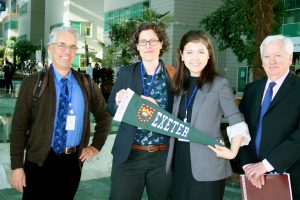By Claire Dunlop and Claudio Radaelli, Department of Politics, University of Exeter
In February we led a three-day political science workshop in partnership with Nazarbayev University in Astana, Kazakhstan on theories of learning, governance and public policy. This British Council workshop enabled us to bring a dozen UK-based academics to Astana to work with a similar cohort of researchers based at Nazarbayev University and other universities in the country. We had sessions on modes of learning and whether they work well – and for whom. But we had our hands-on moments with sessions on methods to code and analyse empirically the manifestations of learning processes, and whether the EU crisis is a model of ‘failure to learn’ or something else. Sharing our models and research in progress with the participants from two different countries (Kazakhstan and UK) exposed our own implicit cultural presuppositions we hold when we theorize learning in governance and public policy. We also felt that there was lot of enthusiasm among the post-PhD and doctoral students in Kazakhstan for public policy theories and their empirical applications. In contrast to other fields of political science, public policy analysis really tackles issues ‘in the real world’.
For us, it was the first time in Astana – we knew it would be cold in February, but when we saw -26C on arrival at the airport we could not believe it. Cold, however, does not mean bad weather, we had plenty of sunshine throughout the workshop. We went to see the national museum which is supposed to tell us ‘everything’ about the history and identity of the country. Guess what, after the antiquities, Golden Man, woollen yurt and President-themed room, we found a room with panels dedicated to regulatory reform, governance and privatization? This was the first time we saw ‘our stuff’ (the object of our academic writing) in a museum!
